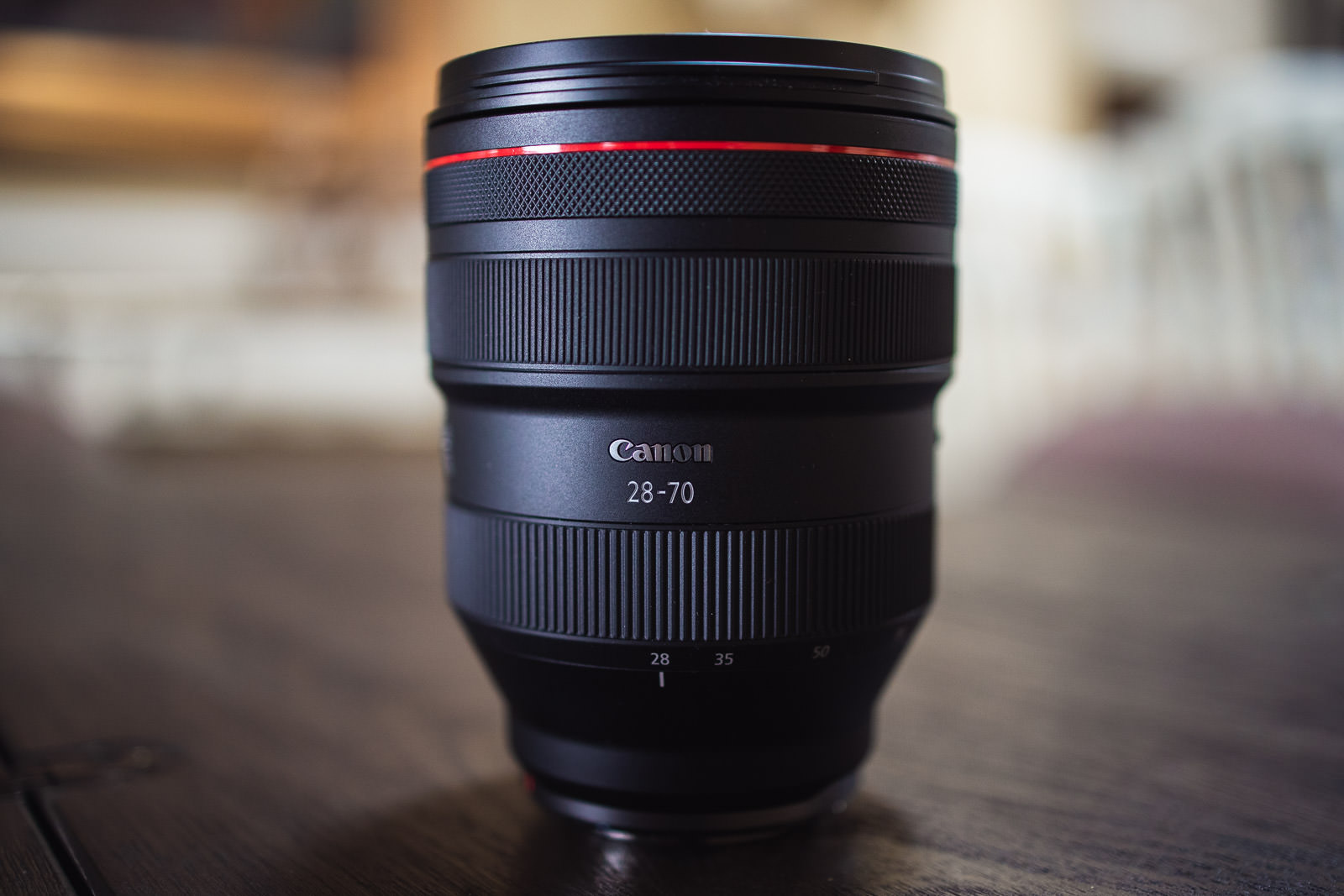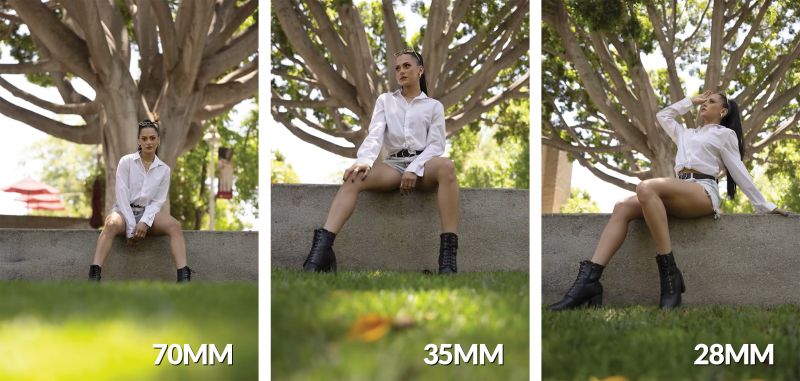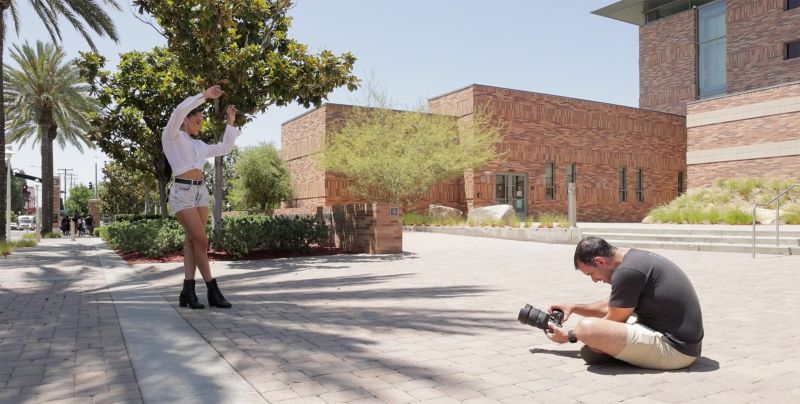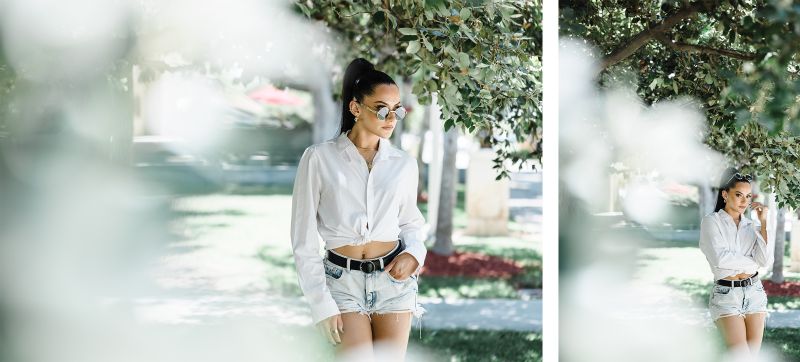
The Canon RF 28-70 2.0L is the newest wide-mid zoom lens offered by Canon for the EOS R mirrorless camera system. It’s also a revolutionary lens in that it offers the widest aperture of any zoom lens in its focal range. This makes it a truly special lens. But as one of the most expensive zoom lenses Canon offers at $2999, is it worth the price tag? In this article review, we’ll discuss the pros and cons of the Canon 28-70 F2 lens to help you make an informed decision.
Canon RF 28-70mm Specs
- Focal Length – 28 to 70mm
- Maximum Aperture – f/2
- Lens Mount – Canon RF
- Image Stabilization – No
- Minimum Focus Distance – 1.28′ / 39 cm
- Dimensions – 4.09 x 5.5″ / 103.8 x 139.8 mm
- Length at Maximum Extension – 6.34″ / 161 mm
- Weight – 3.15 lb / 1430 g
- Price – $2999
- Check Most Recent Pricing : B&H | Amazon | Adorama
Canon RF 28-70mm 2.0L Video Review
This is one of the first professional RF lenses to really prove to us what the new RF mount is capable of. What we’re getting are lenses that have brought the glass far closer to the actual sensor. I’ve been shooting with this lens for several months now, ever since the release of the Canon EOS-R, and I’m pretty much set on removing every other lens from my kit. I’m actually dead serious. In fact, it’s so good that on my last few portrait sessions, 90% of my images were taken solely with this lens. Here are the primary reasons why I fell in love with the Canon RF 28-70.
Canon 28-70 Pros
Design of the Canon 28-70 F2

As with all of the new RF lenses Canon has released to date, the RF 28-70 2.0L is a gorgeous lens to look at and hold. With the same plastic matte black finish as you find on the RF 50 1.2, and the brushed metal attachment ring, you’ll be turning heads every time you whip this lens out of the bag. Those head turns, however, might just be because this thing is huge. and heavy. We’ll discuss the size and weight in the “cons” section of this review.
Image Quality of the Canon 28-70 F2
The RF 28-70 2.0L takes beautiful images with great color and excellent handling of barrel distortion at the wider end of the lens. These new RF professional lenses are designed to resolve incredible amounts of detail, I’m talking about 100MP and beyond.

The reason why I disliked the 24-70 so much is that I felt like it lacking in so many areas. I had to use every other component of compositional theory to make my images more interesting because the lens didn’t assist the image. The Canon 28-70, not the same story. There is so much character and depth that can be pulled from each image, regardless of the shallow DOF or not, that can be seen in each capture. The rendition of color and contrast from the RF line of lenses are remarkable. With this lens, you get that nice prime DOF with nice lens vignetting pulling you into your subject.
Sharpness of the RF 28-70 2.0L
On top of that, it’s very sharp. That should be a foreshadow of what Canon has in store for this next generation of cameras because the EOS-R and the EOS-RP can’t fully take advantage of this yet, which means we’ll be seeing some mirrorless megapixels monsters very soon. And to be honest, it’s about time they catch up to their competitors in the mirrorless market.
Wide open, at 2.0 however, you may lose some sharpness. While it’s sharp enough to create beautiful images, pixel peepers will likely find the results a bit softer than expected. However, itt’s very sharp at f/2.8, though, and extremely sharp as you close down.
The first image below is shot at f/2.0 and the second was shot at f/2.8. You can see from the cropped image in both that the image shot at f/2.0 is noticeably softer than the image shot at f/2.8. Am I being nitpicky? Well yes, but that’s my job.


That said, as the first zoom lens in the wide-mid focal range to give us an f/2.0 aperture, Canon should be commended for their innovation. It lets in a full stop more light and gives you a little bit more bokeh to work with than you’ve ever had on a zoom lens in this range before.
Versatility of the Canon 28-70 F2
The focal range of the Canon 28-70 F2 is perfect for most types of photography. At 50-70mm, we get great portraits with incredible prime-like bokeh. 28-35mm provides a great angle of view that’s able to exaggerate depth and perspective. Being able to have this range of looks packed into a single lens means less gear to carry around. Check out this scene I captured with Kiara at 3 different focal lengths: 70mm, 35mm, and 28mm.


Here are the final images edited with Visual Flow’s Pastel Preset Pack.

A wide angle lens is perfect for exaggerating length. By getting down low and angling up, you can make tall things look even taller. Or, by leaning into the camera, the wide angle exaggerates the distance between the camera and the subject.

The 28mm on this lens provides a great angle of view to capture the palm trees in this scene. With the model posing alongside the trees, we get these great shots that capture the Southern California vibe.
Depth of Field of the Canon 28-70 F2
We’re getting a variable lens range at f/2 instead of f/2.8, that alone is something worth celebrating. As a zoom lens that shoots at f/2 w/ a 9 blade aperture, you can accomplish wonderful depth and background whether shooting zoomed or wide. It gives us silky smooth bokeh at a variety of focal lengths, essentially eliminating the need for carrying around multiple prime lenses that fall into this focal length range.

In the last point, I briefly pointed out the incredible bokeh this lens produces. Let’s put it to the test as we capture depth at 70mm. I placed the model underneath a tree with good side light from just outside the shade.

Using the tree as a foreground element, I captured this series of portraits from varying distances. Notice the softness in the bokeh comparable to that of prime lenses when we’re wide open at f/2.

We stopped by another location where I demonstrated the portrait capabilities, but this time, at about 50mm. I used the pillars as a pattern in the foreground and background. With a wide open aperture, we got tack sharp focus on the model as everything else falls into a clean blur.
Bokeh of the Canon 28-70 F2
With an aperture of f/2.0, everyone is naturally going to ask about the bokeh. I’m happy to report that the bokeh on this lens is absolutely spectacular, especially at 70mm, f/2.0. Out of focus elements are creamy and smooth and bokeh balls are nice and round thanks to the rounded 9-blade diaphragm. The Canon RF 28-70 2.0L has hand-down the best bokeh of any wide-mid range lens in its class. That 2.0 aperture really delivers!

Focus Speed of the RF 28-70 2.0L
This Canon 28-70 F2 is also absolute lightning at focusing. When set to infinity, the RF 28-70 2.0L can focus on an object at the nearest focusing distance faster than I’m able to time it. It focuses throughout the full focusing range nearly immediately with very minimal hunting. It’s also whisper quiet. So you won’t have to worry about interrupting a special moment with this lens. No one will ever hear you!
Canon RF 28-70 2.0L Cons
Cost of the RF 28-70 2.0L
You can buy this lens for a whopping $3,000 dollars! Compare that to the 24-70 II equivalent for Canon cameras and you are looking at a ~$1,650 difference. You could almost buy 2 Canon 24-70’s for the price of one Canon 28-70, not to mention third-party equivalents, like Sigma and Tamron, are even cheaper. Combine that with an EOS-R or whichever Canon Mirrorless and you are looking at $5K out the door, that’s nutso! Like any piece of nice glass, if you see this as an investment, then the price tag warrants the use that the lens will get. If this lens were $2000 I’d recommend it enthusiastically. But at $3000, I think it’s probably a niche product for those who want the absolute best wide-mid zoom lens money can buy.
Heavy Weight of the Canon 28-70 F2

Yes, I’ll say it again. It’s big and heavy. The lens’ dimensions are 4.09 x 5.50″ and it weighs a solid 3.15 lbs. That may not seem that big or heavy, but by comparison, the Canon 24-70 f/2.8L II is 3.48 x 4.45″ and weighs 1.77 lbs. And if you’ve ever used it, you’ll know it’s a big heavy lens in its own right. The RF 28-70 2.0L is over an inch longer, half an inch wider, and DOUBLE the weight. When attached to the front of the EOS R, it feels very front heavy and you almost need two hands on it at all times to keep from dropping it. So is all that extra size and weight worth it?
Lack of Image Stabilization

It still doesn’t have IS, and for $3K, I was expecting it! It would have made the lens so incredible from a cinema and video standpoint and also would have justified the high price tag.
Not Quite Wide Enough (Sometimes)

There are times where I wish so much that the Canon 28-70 F2 could zoom out to 20mm or even just 24mm, where I’m shooting a pano-stitch because 28mm just isn’t quite wide enough. But, I’m sure that would have created other monumental physics problems if it were, still though, that would have made it perfect in my book. I don’t want to have to carry around my 16-35mm just to feel secure to capture those moments when you need a bit more range in focal length.
Conclusion – Should You Buy This Lens?
Is the Canon 28-70 F2 lens worth the cost, size, and weight? That depends who you are. If you own an EOS R and absolutely don’t want to use an adapter, or if you really love using zoom lenses and want the extra stop of light, extra bokeh and you have $3000 in the budget, then I’d recommend this lens to you. It’s probably the best lens in its focal range ever created.
That said, if you use anything other than the EOS R (obviously), or have an EOS R but you want a wide-mid zoom lens that is incredibly sharp while not needing the extra stop of light of the 2.0 aperture, I’d recommend the Canon 24-70 2.8L II instead. It retails for $1699, is much lighter, a little smaller, and takes images that are just as good.
This is a great lens for wedding and landscape photographers who want the versatility of a zoom lens, but also need a fast aperture for shooting in low light or creating portraits with a shallow depth of field. Likewise, sports photographers and photojournalists will love this lens for its quick focusing speed and overall excellent image quality.
On the other hand, if you’re a street photographer or someone who needs to be a bit more inconspicuous when shooting, this probably isn’t the lens for you. Or if you’re a landscape photographer who doesn’t need the low light ability of a f/2.0 aperture, there are cheaper options out there for you.
With so many photographers working on the go, versatility becomes a bigger factor in the gear that we choose. We no longer need 5 different lenses when one can do the job. Pair it with today’s incredible camera bodies and we have a workhorse for any gig or project. Of course, that lens will vary depending on the kind of work that you do. I’m excited to see what lens will come out in the future that may top the Canon RF 28 70 f/2 as my favorite lens. What’s your favorite lens?




Get Connected!